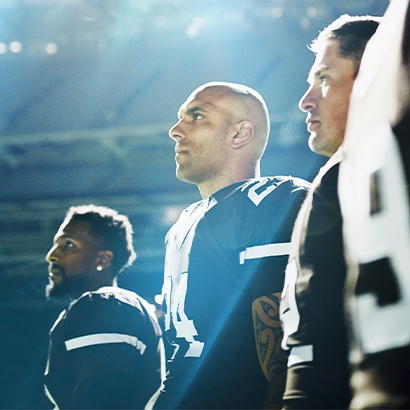Many athletes think about their careers after sports, with some choosing to become entrepreneurs. Learn how a trusted Financial Advisor can help plan for success.
Entrepreneurs and athletes have a lot in common: both have competitive drives and get-it-done mindsets. They don’t shy away from calculated risks and consider failure as a learning opportunity.
The traits that can help athletes win championship rings and trophies can also help them succeed as entrepreneurs. However, the first steps into an entrepreneurial career or venture can be daunting. Just as learning and mastering any sport can be grueling, building a business is also hard work, with a steep learning curve and a high risk of failure. And just as athletes benefit from coaching, entrepreneurs can thrive with professional advice that helps them make sound decisions and avoid unnecessary risks that wound hinder their financial long game.
Morgan Stanley’s Global Sports and Entertainment Directors and Financial Advisors—several of them former pro and collegiate athletes—often advise their clients about their post-playing career as part of long-term wealth planning. Here are three tips they shared for athletes who may be interested in going into business for themselves.
1. Plan Your Next Move in the Off-Season
For athletes, an entrepreneurial second career can mean a variety of things. Traditional opportunities include restaurant franchises, car dealerships and real-estate development. Some have converted their star power into their own personal brands and have launched product lines in food and fashion. Others may become corporate brand ambassadors. In recent years, more athletes are entering the field of venture capital, building teams of advisors to vet promising startups for investment in sectors they feel passionate about. Another emerging trend: ownership through a majority or minority stake in a professional sports franchise
Ask yourself: What pursuits appeal to you and what would be a good match with your skill set? What skill sets and experiences do I want to add to my repertoire? The off-season is an ideal time for athletes to explore these questions, assess their options and risk appetite, and begin networking with people who can help educate and open doors for them.
Professional players associations have encouraged career exploration by offering programming like seminars and career transition programs, such as internships; and Financial Advisors can help sort through these opportunities to identify good fits. Athletes must be willing to candidly evaluate their abilities, relationships, and interests to move forward.
2. Look Before Leaping at New Opportunities
Athletes attract myriad people into their orbit. Some may not have the most honorable intentions and could try to pitch them all kinds of flimsy business ideas—often as “sure bets.” Building a team of trusted advisors and mentors can help separate honest brokers from fast-talking speculators.
Such a team of trusted advisors might include agents, attorneys, accountants, Financial Advisors and other individuals and professionals that an athlete trusts to help vet opportunities and determine whether these opportunities fit the broader, long-term financial goals for themselves. For example, an NFL player who retires at age 35, may not have access to his retirement benefits for many years. That may drive a different set of considerations for building a second career to help sustain the player and his family, while building wealth for the future.
3. Keep an Open Mind
Career 2.0 can be a new idea or a tried-and-true formula. It largely comes down to personality and opportunity. Not every star athlete gets an offer to join the broadcast booth after retirement. Some may choose to be coaches or leverage their brand appeal and endorsement deals to cultivate strong business relationships or executive jobs. The key is to remain open-minded – and strategic. Opportunities do not always appear obvious nor fall in your lap, at first.
In some unfortunate cases, the second career yields a bad fit or is short-lived, requiring another career pivot. Sometimes this happens and is not the end of the world, but ideally, this recalibration comes at a minimal cost to long-term financial security. The key is having the right people around you to sort what happened and learn from the experience to reposition and refocus your efforts into a successful path forward.
Whatever path an athlete may choose, it's important to avoid feeling invincible when it comes to making your next move, and it is ok to be inquisitive and open-minded when you are embarking on this new chapter and learning best practices. It is not only OK, but we encourage that approach.
Learn more and connect with a Global Sports and Entertainment Director near you to help guide and develop a sensible transition plan for your next chapter. Then, you can enjoy your second career, knowing you are better prepared for what the future holds.



